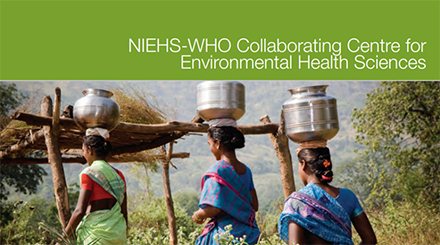By Mali Velasco

NIEHS announces its redesignation as a World Health Organization (WHO) collaborating centre through 2025. This collaboration supports the NIEHS mission, as outlined in the 2018-2023 strategic plan, to provide global leadership for innovative research and interventions to meet the environmental public health needs of people in the U.S. and around the world.
Since the collaboration's establishment in 2013, NIEHS has assisted the WHO in promoting cooperation among research institutes, raising global awareness of emerging environmental health issues, and supporting education and training efforts in environmental and occupational health sciences.
Examples of outcomes from this collaboration include the sponsorship and organization of several international workshops, trainings, and environmental health meetings, and the establishment of networks of researchers around the world. Additionally, the NIEHS-WHO collaboration is making strides to better translate and communicate the impacts of climate change on public health.
Building on these advancements, the 2021-2025 redesignation offers NIEHS opportunity to incorporate new priorities and commitments into its workplan and address increasingly complex environmental health challenges.
"Our role as a WHO collaborating centre builds on our institute's strong global health research program that funds grants around the world," said Gwen Collman, Ph.D., NIEHS senior advisor and director of the NIEHS-WHO Collaborating Centre. "Our work focuses on emerging environmental health issues that impact the health of populations in low- and middle- income countries, supports the uptake of systematic review methodology to understand global impacts of environmental exposures on health outcomes, and supports research fellows from around the world in our intramural program."
Key Focus Areas
Future activities of the collaborating centre will address these four themes:
- Chemical Risk Assessment Network
- Children's Environmental Health
- Climate Change and Health
- Household Air Pollution
Climate Change and Health
NIEHS continues to support WHO in endeavors to raise awareness of the health consequences of climate variability and climate change. The institute has committed to share curated data from the NIEHS Climate Change and Human Health Literature Portal , a knowledge management tool for locating the most relevant scientific literature on the health implications of climate change. NIEHS will also work with WHO in exploring relevant climate change and human health datasets.
Household Air Pollution
Building on lessons learned from the NIH Household Air Pollution Intervention Network (HAPIN) Clinical Trials and the Implementation Science Network, NIEHS will host regional workshops to raise awareness about the urgency of reducing exposures to household air pollutants. These workshops are a way to promote the development and implementation of clean technologies to reduce exposures and improve health.
Children's Environmental Health
NIEHS continues its global leadership in Children's Environmental Health and endeavors to raise awareness, build capacity, and help guide the development of protective measures for children around the world. NIEHS will support WHO with development of technical documents about childhood environmental exposures and associated health outcomes. These resources will help to educate, coordinate collaborative research, and develop interventions to protect children during their most vulnerable windows of development.
International Risk Assessment Network
NIEHS was an early and active participant in the WHO Chemical Risk Assessment Network , which aims to bring together representatives of government agencies, researchers, and members of nongovernmental organizations to evaluate and minimize exposure to toxic chemicals. NIEHS will continue to provide technical support for activities of the Emerging Chemicals Working Group and the Capacity Building Working Group to train people from interested nations and organizations in exposure science and toxicology.
WHO Collaborations Within NIH
"We have reached another milestone in our relationship with the WHO by having our Collaborating Centre redesignated for the next four years," Collman stated. "The Collaborating Centre is one of only three WHO collaborating centres designated at NIH, and we look forward to working closely with them to build synergies in our collective engagement with WHO."
At NIH, another WHO collaborating centre is with the National Cancer Institute , and the third is at the National Institute of Allergy and Infectious Diseases.


